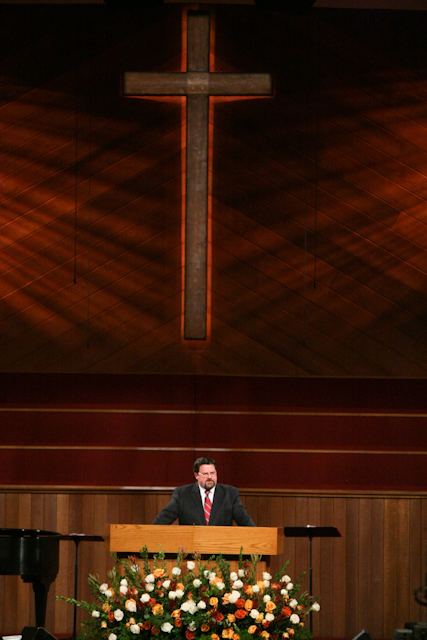
by Bret Capranica | Dec 30, 2010 | Reading
I think you should read your Bible through each year. However, this post is not to suggest that those who do not choose an annual Bible Reading plan are somehow doomed to a spiritual wasteland. Simply put, we need to be reading our Bibles. I am also not suggesting that this approach to reading Scripture should replace detailed study of Scripture. I am merely suggesting a few reasons I have found it helpful to read through the Bible each year. New Translations. I rarely read the same translation for my annual reading. I generally start a new translation of the Scripture with each year”™s beginning. I have found this helps me think more critically of a given passage and how it may differ from a more well-known translation (I read through the Holman Christian Standard Version this year). I also find myself less tethered to the physical location of passages in my Bible (i.e., “oh, that verse was on the top left corner of the page about ¾ of the way through John), and more tied to the chapter and verse. It allows me greater dexterity in remembering where significant passages are located. Full Perspective. Reading through the entire Bible every year helps me develop a mindset of seeing the details in light of the whole of Scripture. Context. Regularly reading through large swaths of Scripture helps me to see each portion within the context of its given book. So, when I pray through my reading devotionally, I have a Spirit-inspired context from which to think through how to apply the passage”™s God-originated intent. Non-Neglect. I can”™t neglect any...

by Bret Capranica | Sep 12, 2009 | Featured Articles, Prayer
Using the Word Where does the Bible fit into your concentrated time of prayer? For me it must be integral if my prayer life is to remain fresh. Connect the word to your prayer time. While my “quiet time” might appear to be segmented (if I listed what I do) into sections of Bible reading and then intercession, it really isn’t the case. My time in the Word (I currently use the Discipleship Journal plan, reading through 4 sections a day), is the platform for and springboard to all I pray about and for. I generally write down a verse or two into my journal from my reading, and spend a few minutes meditating and praying through it. I often write what I’m praying, which keeps me concrete in my thoughts (and often awake). I may glance over all the verses I have written down and think through how the totality of them tend to address my heart and life and write a response. This is usually a time for confession of sin and pleading for greater insight and application. When it comes to my times of intercession (which I will write about tomorrow), I generally have a few passages assigned to the topics I have arranged around my intercessions (again, more tomorrow). I will read one of these sections and use it as the basis for my time of intercession. D. A. Carson’s book on the prayers of Paul is a real help here and a huge stimulus in my thinking on prayer. Connect what you heard from sermons to your prayer time. I take my sermon notes in...
by Bret Capranica | Mar 24, 2009 | Christian Living, Miscellaneous
Good material here: 18 Tricks to Memorize More Scripture | Fallen and Flawed HT: Desiring God...

by Bret Capranica | Mar 7, 2009 | Ecclesiology, Featured Articles, Pastoral Ministry, Personal, Preaching
My expectations for encouragement, equipping, and fellowship as well as theological, spiritual, and practical stimulation were all exceeded this past week. I’m exhausted as I write, but overjoyed with the benefits from a fruitful three days at the 2009 Shepherds’ Conference. In an abbreviated, fashion, here were the highlights for me: Of the three days, Friday was the highlight for me. Every message hit me personally and practically (Phil Johnson, Alex Montoya’s seminar, Steve Lawson, and John MacArthur). Every song, every meal, every conversation, every moment was especially sweet to me that day. You should go and listen (or re-listen) to each of the messages from Friday. I was prepared to return to the flock. Overall: The messages ““ every one of them was used significantly in my heart. I could never communicate it all. John MacArthur stirred up my passions for the authority and sufficiency of the Scriptures. He reminded me of the simplicity, yet profound impact the basics of Scriptural ministry have. He taught me again the value of plumbing the depths and doing your best to make them clear in your preaching. Tom Pennington, challenged me to protect and build the church the way Scripture demands. Rick Holland fixed my ministry focus on Christ and challenged me to make my pursuit of His glory ultimate. Albert Mohler infused my soul with a passion to preach so that the authority of Christ is publicly displayed and obvious. Phil Johnson demonstrated the relevancy of the Scriptures taught in their historical context. He powerfully demonstrated the implications of the passage (Titus 2:6-8) to the issue of our reverent speech...
![When Preaching Is Not Central]()
by Bret Capranica | Feb 26, 2009 | Featured Articles, Preaching
A few quick thoughts on what happens when the pulpit and expository preaching loses a place of centrality within the life of the local church: Personal intake of Scripture becomes tiresome Personal prayer becomes little more than religious day-dreaming An atmosphere of worship gives way to a craving for entertainment Truth is replaced with preferences Discipleship is dismissed by the cult of personal excitement Culture becomes central Creativity becomes a mantra Personal desires become dominant Tradition becomes foundational Counseling becomes, at worst, psychological, and at best merely conservative Dr. Laura-type of advice or simply relational Fellowship becomes superficial Unity becomes merely relational Missions becomes nothing more than temporal societal betterment The gospel becomes self-help Discipleship becomes nothing more than a mere decision All this will be true because people, for people’s sake, become the focus and God becomes a servant to their own lust for centrality (2 Timothy 4:1-4) ““ our thoughts are no longer tethered to what God has systematically revealed to us about Himself. In the end, people are not best served where they are most prized. When expository preaching is not central in our life: We ultimately and over time won’t feel fed, satisfied, fulfilled The grass will always look greener in another ministerial field “¦because ultimately, God, truth, and His glory is not what we crave. Or perhaps we are misinterpreting our cravings and feeding them with the wrong things. When expository preaching is not central in the church’s life It will give way to the whims of culture It will be replaced by the mystical It will be sapped of true spiritual power It...










